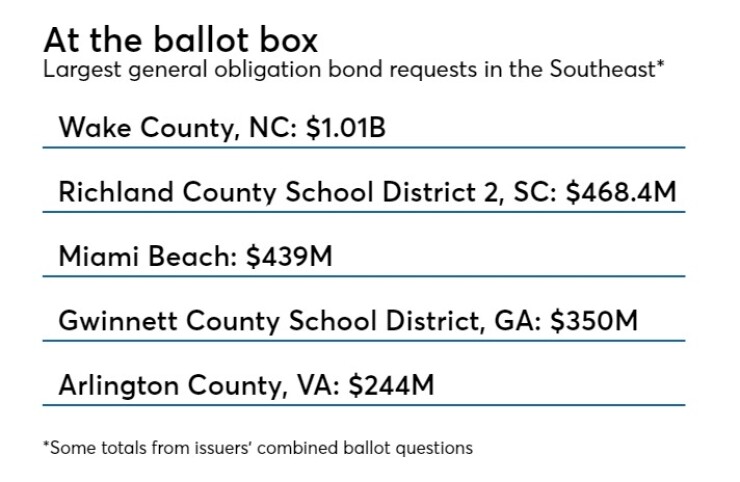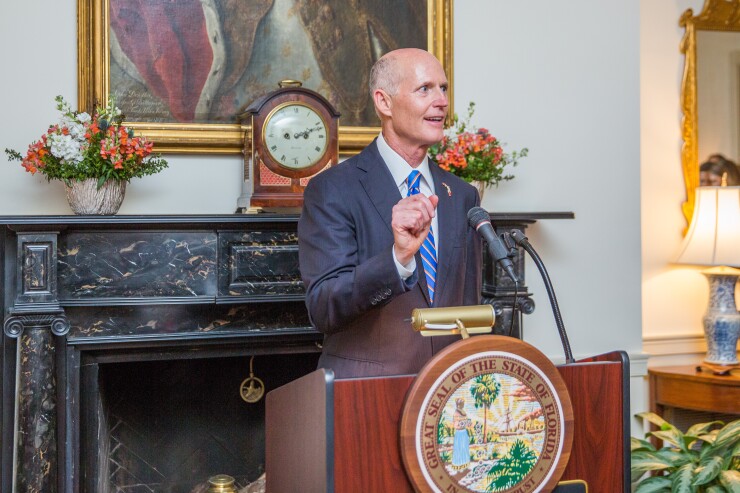Voters across the Southeast are being asked to approve more than $3.85 billion of borrowing for schools and other infrastructure needs in the midterm election.
The Nov. 6 election will also select new governors in Alabama, Florida, Georgia, South Carolina and Tennessee. In Florida, a corruption investigation has dogged Florida’s Democratic nominee for governor, while in Georgia lawsuits have been filed claiming that voter suppression techniques have been used.

In Florida and North Carolina voters will decide measures that could make it difficult for their state governments to raise taxes.
Triple-A rated Wake County, North Carolina, has the largest combined bond request among the region's 11 states.
The county is asking voters to approve a combined $1.01 billion in general obligation bonds. Voters in three separate questions will be asked to approve $548 million to fund schools, which are experiencing an influx of 2,300 new students annually; $349.1 million for Wake Tech Community College improvements; and $120 million to finance county parks and preserve open space.
The school bond referendum is the most economical way to renovate and build new facilities, according to the business-backed nonprofit WakeEd Partnership.
The group pointed to a September 2015 report entitled “The Economic Impact of Wake County Public Schools” by North Carolina State University Professor of Economics Michael Walden, which said that for every $1 spent on schools, $2.23 is generated in the local economy.
“That’s the kind of return every investor dreams of realizing, and as investors in our public school system, Wake County’s taxpayers have the benefit of that return,” said WakeEd President Steve Parrott.
The partnership also supports borrowing because businesses depend on a good education system, said WakeEd Board Chairman Stephanie Jensen.
“Employers want a strong public education system, which will produce the top talent who will become the next wave of innovators,” said Jenson, director of professional and specialty solutions at chemical producer BASF.
If voters approve the school bond, $279 million will help pay for major facility renovations at seven elementary schools, three middle schools and a high school; $139 million will be used to build five elementary schools, one middle school and a high school; and $93 million will be used for safety improvements and digital classroom technology.
South Carolina’s Richland County School District No. 2 is asking voters in two questions to approve a combined $468.4 million of bonds.
The first question will request to borrow $381.95 million to renovate schools and to make safety and security improvements, to buy buses, and to build new elementary and middle schools.
The second question will ask for approval for an additional $86.5 million of bonds to build a performing arts center and upgrade athletic facilities, including a football stadium expansion.
Miami Beach, in the region’s third-largest bond request, will ask voters to approve borrowing a total of $439 million for infrastructure needs.
Voters in three separate ballot questions will be asked to approve $198 million of GOs to finance neighborhood and infrastructure projects; $169 million for parks, recreation and cultural facilities; and $72 million for police, fire and public safety projects.
Five states, including Florida and North Carolina, will ask voters to approve ballot measures that would cap, limit or restrict the taxing ability of states, Rachel Barkley, vice president at Loop Capital Markets, said in the firm’s October Municipal Strategy Report.
“Any measure that restricts a state’s ability to raise revenues should be concerning to bondholders,” Barkley said. “Measures that roll back currently levied taxes are likely to have the largest immediate effect while those that prevent states from having their tax structure adapt to economic changes may be the most restrictive over time.”
Florida Amendment 2 would make permanent a 10% cap on annual non-homesteaded property assessments. The cap applies to all taxing authorities except schools. It’s been in place for 10 years and is currently set to expire Jan. 1. It requires a 60% supermajority to pass.
If it does, Barkley said local governments would permanently forfeit a measure of revenue flexibility. The Florida Senate has estimated that the bill would permanently reduce the non-school property tax base by between $432.5 million and $661.1 million.
Amendment 5, a measure requested by Gov. Rick Scott and placed on the ballot by the Sunshine State’s GOP-led Legislature, would require a two-thirds vote in each chamber to enact new taxes or fees, or to increase existing taxes and fees.
Currently, a simple majority vote is only required to make such changes.
“The House and Senate are currently both under Republican control, although they do not have a two-thirds supermajority in either chamber,” Barkley said. “Assuming the lack of a supermajority holds going forward, the need for bipartisan support for tax and fee measures would likely make them more difficult to achieve.”
For Amendment 5 to pass, 60% of voters must approve it. Fifteen states require a supermajority vote for various tax increases.
In North Carolina, an income tax cap amendment would lower the maximum allowable state personal and corporate income tax rates to 7% from 10%.
The Tar Heel State currently levies a flat 5.499% personal income tax, which is scheduled to fall to 5.25% in 2019, and a 3% corporate tax, so passage of the amendment wouldn’t have an immediate impact, according to Barkley.
“However, the permanence of a constitutional amendment means that this may have credit implications in the future as the state will be limited in its revenue-raising capability,” she said, adding that this is meaningful because both the personal and corporate income tax rates have been at levels above the proposed cap in the past.

In Alabama, Gov. Kay Ivey, a Republican, is seeking her first full term as governor. Ivey, the former lieutenant governor, ascended to the governor’s office in April 2017 after Gov. Robert Bentley pleaded guilty to two misdemeanor charges and resigned from office, rather than face impeachment proceedings.
Ivey faces Tuscaloosa Mayor Walt Maddox, a Democrat.
In Florida, the top two candidates on the gubernatorial ballot are former U.S. Rep. Ron DeSantis, a Republican who touts his fealty to President Trump and echoes the president's race-based appeals in his campaign against Tallahassee Mayor Andrew Gillum, a Democrat who would become the state’s first African-American governor.
Recent polls have shown Gillum with a slight lead in the race even though his campaign has been dogged by a long FBI investigation into possible corruption in the state’s capital city. The investigation involves Adam Corey, a city lobbyist who arranged several trips that included Gillum.
In June, a complaint was filed against Gillum with Florida Commission on Ethics. On Oct. 15, the commission issued a subpoena for Corey’s records.
Adam Kise, Corey’s attorney, released the records to the public on Tuesday. They appear to show that an undercover agent gave Gillum a ticket to the Broadway show “Hamilton” during a trip to New York City in 2016. Gillum maintains that he received the ticket from his brother.
Four lesser-known candidates for Florida’s governor are also on the ballot.
The six candidates want to succeed Scott, who can’t run again due to term limits. Scott is running against incumbent U.S. Senator Bill Nelson, a Democrat who has held the seat since 2000.
In Georgia, at least three lawsuits have been filed contending state and local election agencies have improperly employed various voter-suppression techniques, including throwing out an inordinate amount of absentee ballots for missing things like middle initials. The Republican candidate for governor, Secretary of State Brian Kemp, is the state's top election official.
Seven candidates are running for Georgia’s top office because Gov. Nathan Deal, a Republican, is term-limited.
The three candidates who formally qualified to run are former state House Minority Leader Stacey Abrams, a Democrat, Kemp, and Libertarian Ted Metz. There are four write-in candidates.
Recent polls show Abrams and Kemp about even. The race will go to a runoff if no candidate secures a majority Nov. 6. If Abrams wins, she would be Georgia’s first African-American governor.
South Carolina Gov. Henry McMaster, a Republican, is seeking office in his own right after succeeding Nikki Haley in 2017 when she resigned to accept a position as ambassador to the United Nations. He’ll face Rep. James E. Smith Jr., D-Richland, on the Nov. 6 ballot.
In Tennessee’s race for governor voters will choose between Republican businessman Bill Lee and former Nashville Mayor Karl Dean, a Democrat. Both are seeking to replace the GOP’s Gov. Bill Haslam, who is barred from seeking a third term.





